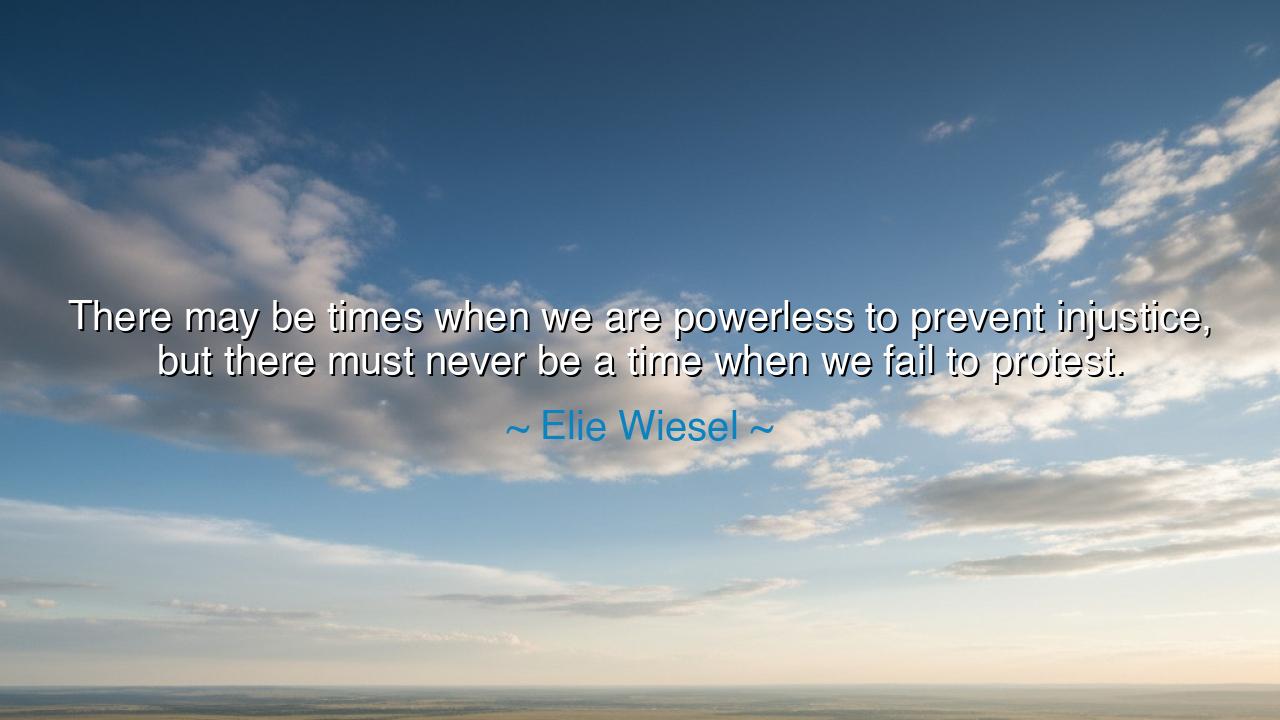
There may be times when we are powerless to prevent injustice
There may be times when we are powerless to prevent injustice, but there must never be a time when we fail to protest.






The words of Elie Wiesel, survivor of horror and witness to silence, cut deep into the soul: “There may be times when we are powerless to prevent injustice, but there must never be a time when we fail to protest.” Born from the ashes of the Holocaust, these words are not merely philosophy—they are a commandment forged in suffering. Wiesel knew what it meant to live in a world where evil was allowed to flourish because too many chose the safety of silence. His voice calls to us across generations, urging that even when our hands cannot stop an oppressor, our voices must still cry out.
The meaning is profound: powerlessness is not an excuse for silence. To protest is to affirm our humanity, to draw a line between ourselves and injustice. We may not always prevent evil’s triumph, but to fail to speak is to share in its guilt. Protest is the shield of dignity, even when victory is out of reach. Wiesel’s wisdom tells us that silence in the face of cruelty is not neutrality—it is complicity.
The origin of these words comes from Wiesel’s life as a Holocaust survivor. He endured the camps of Auschwitz and Buchenwald, where millions were slaughtered while much of the world looked away. He emerged from those flames determined that silence must never again serve as the ally of murderers. Through his writings, such as Night, and his speeches, he insisted that memory and protest were sacred duties of the living. In his words, we hear the echo of those who had no voice left to cry out.
History bears witness to this truth. Consider the American Civil Rights Movement. Many could not stop segregation laws by themselves, but they could march, they could sing, they could speak. Even when beaten, even when jailed, their protest carried power. And in time, that power changed laws and awakened the conscience of a nation. Their voices were proof that even when powerless to end injustice immediately, protest itself creates a force that eventually reshapes the world.
The deeper teaching is that protest is not only about changing governments or laws—it is about preserving the soul. A man or woman who remains silent before oppression allows part of their own spirit to die. To protest, even in futility, is to keep alive the fire of resistance, to declare that injustice is not normal, not acceptable, not eternal. In this way, even the weakest voice can become a torch against the darkness.
The lesson for you, seeker, is this: never underestimate the power of your voice. You may not always win the battle, but your protest ensures that evil does not go unchallenged. To speak out is to honor the oppressed, to remind the world that cruelty is seen, named, and resisted. Even a whisper of truth is stronger than silence, for it joins the chorus of those who refuse to surrender to despair.
Practical actions follow. Do not remain silent when you witness discrimination, cruelty, or lies. Stand with the weak, speak for the voiceless, and bear witness when others hide. Support movements that resist oppression, however small your contribution may feel. Teach your children the duty of protest, so that silence does not once again become the graveyard of the innocent. For in every age, injustice waits for silence to shield it.
So remember, children of tomorrow: you may not always stop the tyrant’s hand, but you can always raise your voice. And that voice, joined with others across time, becomes the storm that breaks empires. Never fail to protest, for silence is the seed of injustice, but protest is the eternal flame of the human spirit.






AAdministratorAdministrator
Welcome, honored guests. Please leave a comment, we will respond soon